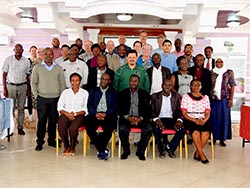Beginning December 2018, N2Africa project has undertaken a policy advocacy activity in two steps; i) bilateral consultations with 15 organisations (in government, private sector, NGO’s) to understand perceptions about the current functioning and policy recommendations, for the whole legume sector and of specific segments in the value chain, and ii) a multi-stakeholder workshop in which the results of the policy analysis were presented and discussed, and consensus sought about next steps. These focused on current and future policies, but also considering current and future support programmes, to enhance the place of leguminous crops in agricultural development, and its benefits for the various objectives, relevant in Tanzania.
| Bilateral consultations (step one) took place between 3rd and 7th December, 2018, and stakeholder workshop (step two) took place on 8 May 2019. |  |
The below recommendations (in brief) were reached from discussions of the current situation and constraints along the legume value chain and confirmed by legume stakeholders:
- Give more attention to legumes in policies, strategies and guidelines.
- For legumes as food crops, combine efforts of the Agriculture Sector Line Ministries and the Ministry of Health, and other development partners.
- For soyabean, combine efforts of the Agriculture Sector Line Ministries and the Ministry of Industry and Trade, the Ministry of Labour and Employment, private sector and development partners.
- Strengthen linkages between agricultural research, extension and seed production, to improve farmer access to new seed varieties and technologies.
- Consider (temporary) import tariffs to encourage local production of soyabean. Consider flexible tariffs: protecting domestic soyabean production, but allowing limited import if domestic production falls short.
- Increase its diplomacy efforts with neighbouring and other legume importing countries to facilitate trade and export and guarantee market access.
- Encourage investments in solvent extraction plants to encourage local soyabean production and processing into high quality (low oil content) soya cake, and substitute soya cake import.
- Consider the compulsory use of legumes in recipes and processing of e.g. porridge for school feeding, for better nutrition and to create a demand pulling local production.
For the organisation of the legume value chain, the following recommendations were made about the current platforms:
- Encourage the organisation and strengthening of a legume platform and soyabean platform, under the CPB, representing the sector, as policy dialogue partner with the sector.
- For legumes: revitalise the existing Tanzania Pulse Network
- For soyabean: revitalise the existing soyabean platform, and set up a steering committee led by the SCL (SAGCOT).
- The legume platforms should review the existing government strategies, and make recommendations for improvements
- The legume sector platforms should encourage government, its members, and other stakeholders, to:
- Set up a market intelligence system, combining information about current and expected demand in Tanzania and abroad (volumes, quality, prices).
- Organise farmers in producer organisations, for joint marketing.
- Encourage farmer - buyer contracts and vertical integration.
- Analyse and address efficiency constraints in the value chain.
These recommendations will be tabled for further discussion by the Tanzania Agricultural Policy Analysis Group (TAPAG) then to Agriculture none State Actors Forum (ANSAF), responsible for advocacy of agricultural policies.
Freddy Baijukya, N2Africa Country Coordinator Tanzania
